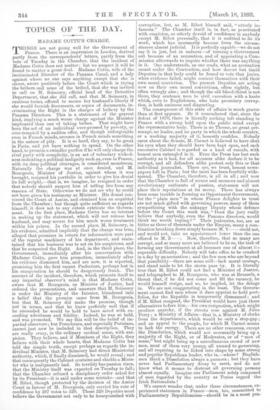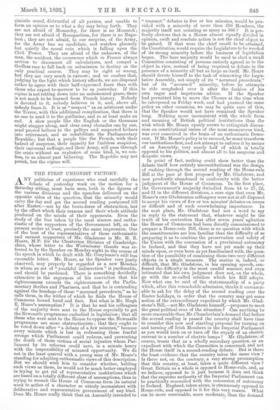TOPICS OF THE DAY.
MADAME COTTUS CHARGE. THINGS are not going well for the Government of France. There is an impression in London, derived partly from the correspondents' letters, partly from the vote of Tuesday in the Chamber, that the incident of Madame Cottu does not matter ; but we suspect it will be found to matter a great deal. Madame Cottu, wife of the incriminated Director of the Panama Canal, and a lady against whom no one says anything except that she is clever, swore positively before the Court which is trying the bribers and some of the bribed, that she was invited to call on M. Soinoury, official head of the Detective Department, that she did call, and that M. Soinoury, in cautious terms, offered to secure her husband's liberty if she would furnish documents, or copies of documents, in- criminating the Right in the charges of bribery by the Panama Directors. This is a statement of the gravest kind, implying a much worse charge against the Minister implicated than one of taking bribes. That might have been the act of an individual over-pressed by poverty, or over-tempted by a sudden offer, and though unforgivable even in French minds, arouses in French minds something in the nature of pity. It is so hard, they say, to be great in Paris, and yet have nothing to spend. On the other hand, to promise a swindler pardon if he will only charge the rival party with complicity, is an act of voluntary wicked- ness indicating a. political malignity such as, even in France, with its deep political cleavages, is considered monstrous. Naturally the charge was at once denied, and M. Bourgeois, Minister of Justice, against whom it was brought, resigned his portfolio in order to give his denial its full weight,—that is, we imagine, he resigned in order that nobody should suspect him of telling lies from any reasons of State. Otherwise we do not see why he could not have given his testimony as Minister. His denial con- vinced the Court of Assize, and obtained him an acquittal from the Chamber ; but though quite sufficient as regards himself, it does not to any extent extricate the Govern- ment. In the first place, Madame Cottu has no interest in making up the statement, which will not release her husband, and may secure for him much worse treatment within his prison. In the second place, M. Soinoury, in his evidence, admitted implicitly that the charge was true, alleged that promises in return for information were part of the regular machinery of his department, and main- tained that his business was to act on his suspicions, and that he suspected the Right. And, in the third place, the Government, immediately after his conversation with Madame Cottu, gave him promotion, immediately after Ibis evidence dismissed him, and are now, it is reported, promising him the first vacant Prefecture, perhaps lest in his exasperation he should be dangerously frank. The account of the incident, therefore, which presents itself to any impartial observer's mind is that Madame Cottu, aware that M. Bourgeois, as Minister of Justice, had ordered the prosecutions, and unaware that M. Soinoury is under the Ministry of the Interior, blundered into a belief that the promise came from M. Bourgeois, but that M. Soinoury did make the promise, though not in terms, and that he knew perfectly well that if he succeeded he would be held to have acted with ex- ceeding adroitness and fidelity. Indeed, he was so held, and was promoted. We say this will be the belief of im- partial observers ; but Frenchmen, and especially Parisians, cannot just now be included in that description. They are really crazy, in the ordinary medical sense, with sus- picion. They believe, and if Members of the Right, they believe with their whole hearts, that Madame Cottu has told the simple truth, except perhaps as regards the in- dividual Minister, that M. Soinoury had direct Ministerial authority, which, if finally dismissed, he would reveal ; and that consequently the Cabinet contains and shields a Minis- ter who is malignantly bad. So terribly has passion risen, that the Ministry itself was expected on Tuesday to fall ; that the Chamber refused a disciplinary order asked for by its President—it is said under some mistake—and that M. Ribot, though protected by the decision of the Assize Court in favour of M. Bourgeois, only carried his vote of confidence by 297 votes to 228. Those 228 Deputies must believe the Government not only to be honeycombed with corruption, but, as M. Ribot himself said, "utterly in- famous." The Chamber itself is, in fact, so penetrated with suspicion, so utterly devoid of confidence in anybody except M. Ribot personally, that it is unfitted to do its work, which has necessarily become from the circum- stances almost judicial. It is perfectly capable—we do not say it in jest, but in sadness—of turning a Government out because of an accusation, and of appointing a Com- mission afterwards to inquire whether there was anything in it. One understands, as one reads, what an accusation meant under the Convention, and how decent but timid Deputies in that body could be found to vote that juries, when evidence failed, might content themselves with their own moral conviction. The present Deputies are acting now on their own moral convictions, often rightly, but often wrongly also; and though the old blood-thirst is not there, they sentence men to civil execution with a haste which, even to Englishmen, who bate pecuniary corrup- tion, is both ominous and disgusting. The consequence of this state of affairs is much graver than at first appears. Be it remembered that, since the defeat of 1870, there is literally nothing left standing in France with a strong hold upon the public mind except the representative body. There is no Throne, no great per- sonage, no leader, and no party in which the whole country, or a working majority of it, honestly confides. Nobody cares about the Senate, M. Carnet is believed to have shut his eyes when they should have been kept open, and each successive Cabinet is regarded as a knot of rascals, with honest men entangled in it. Even the Press has lost such authority as it had, for all accusers alike declare it to be corrupt, and all defenders alike protect only this or that. individual journalist. There are, we trust, honest news- papers left in Paris ; but the taint has been fearfully wide- spread. The Chamber, therefore, is all in all ; and now that the Chamber is full of scenes and menaces and almost revolutionary outbursts of passion, statesmen will not place their reputations at its mercy. There has always been some trouble in forming an Opportunist Government, for the " plain men" in whom France delights to trust are not much gifted with governing powers, many of them sympathising with the unhappy Deputy whose defence before the Court this week was, 'Does the jury really believe that anybody, even the Panama directors, would think me worth buying ?" Their jealousies, too, are as bitter as those of Generals under the Empire, many a com- bination breaking down simply because M. Y.— could not, and would not, take an appointment lower than the one offered to M. Z—. Now, therefore, that so many are corrupt, and so many more are believed to be so, the task of forming any Government at all becomes one of almost ire superable difficulty. Nobody will take office to be crushed in a day by an accusation ; and the few men who are beyond that possibility—there are sonic still—lack moral courage, and stand aside to let the storm pass by. It is literally true that M. Ribot could not find a Minister of Justice, and telegraphed to M. Bourgeois, who was at Brussels, a threat that, if he did not come and fill the vacancy, he would himself resign, and so, he implied, let the deluge in. We are not exaggerating in the least. The Govern- ment cannot find men whom it dare appoint to hold port- folios, for the Republic is temporarily dismanned ; and if M. Ribot resigned, the President would have just three alternatives before him,—his own resignation, which might produce anarchy, if the streets rose against M. Jules Perry; a Ministry of Affairs—that is, a Ministry of clerks from the departments, which would be only a stop-gap ; and an appeal to the people, for which M. Carnot seems to lack the energy. There are no other resources, except the Dissolution, which would not necessarily bring up a majority of the Right, or of Moderates, or of "men of sense," but might bring up a miscellaneous crowd of new men, most of them very young, all unused to governing, and all requiring to be licked into shape by some strong and popular Republican leader, who is,—where ? English- men think a Dissolution always a panacea ; but they have never had Parliamentary decay to meet, and do not know what it means to distrust all governing persons almost equally. Imagine our Parliament solely composed of men regarded by the country as Tories regard the Irish Nationalists !
We cannot wonder that, under these circumstances, ex- perienced statesmen in France—men, too, committed to Parliamentary Republicanism—should be in a most pes- simistic mood, distrustful of all parties, and unable to form an opinion as to what a day may bring forth. They are not afraid of Monarchy, for there is no Monarch; they are not afraid of Bonapartism, for there is no Napo- leon; they are not afraid, to our surprise, of the Army, for the Army has no candidate, and watches gloomily but quietly the moral ruin which is falling upon the Civil Power. They are afraid of the unknown, of the map, the accident, the occurrence which in France always arrives to disconcert all calculations, and compel a Godless race to fall back on submission to destiny as the only practical course. They may be right or wrong, but they are very much in earnest ; and we confess that, judging by the light which history affords, we are disposed rather to agree with their half-expressed fears than with those who expect to-morrow to be as yesterday. If this regime is not rotting down into an unhonoured grave, there Is not much to be learned from French history. Nobody is devoted to it, nobody believes in it, and, above an, nobody fears it. It is as " suspect " as an aristocrat under the Terror, with this additional complication, that there is no one to send it to the guillotine, and so at least make an end. A slow people like the English or the Germans might stagger along, and clear away obstacles one by one, send proved bribees to the galleys and suspected bribees into retirement, and so rehabilitate the Parliamentary Republic ; but that a people like the French, with their hatred of suspense, their capacity for limitless suspicion, their universal suffrage, and their Army, will pass through the crisis without an explosion of some kind, is, we con- fess, to us almost past believing. The Republic may not perish, but the regime will.



































 Previous page
Previous page